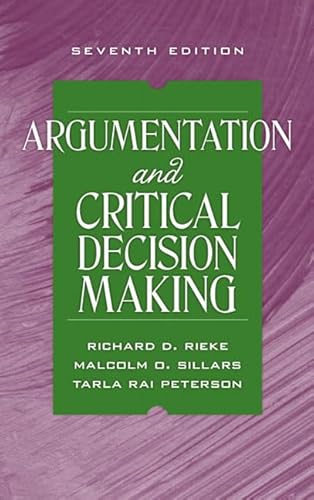The first and most thoroughly developed audience-oriented argumentation book, Argumentation and Critical Decision Making presents argumentation as a cooperative, communicative process. This book examines the general principles of argument in a rigorous yet readable manner and then applies those principles to different spheres of life – law, science, religion, business, and politics – to explore how conventions of argument change when applied to these real world arenas. Focusing on the dynamics of decision making and using real life examples to illustrate principles, Argumentation and Critical Decision Making aims to help readers develop practical argumentation skills within the world of their daily lives.
Argumentation and Critical Decision Making, 7/e
Richard D. Rieke, University of Utah
Malcolm O. Sillars, University of Utah
Tarla Rai Peterson, Texas A&M University
The first audience-oriented argumentation text available, Argumentation and Critical Decision Making presents argumentation as a cooperative, communicative process. This textexplores how conventions of argument change when applied to different spheres of life law, science, religion, business, government, and politics. Focusing on the dynamics of decision making and using real-life examples to illustrate principles, Argumentation and Critical Decision Making aims to help you develop practical argumentation skills.
Features of the Seventh Edition:
- Features five thoroughly revised chapters on the practical application of argument, reflecting new scholarship.
- Includes a new discussion of spheres of argument, emphasizing the relationship among audience, decision makers, sphere, and argumentative practice, and identifying the forms of acceptable argument, what counts as fact, and criteria used in criticism.
- Gives greater emphasis to the role of dialectic as an explanation for why many critical decisions emerge from dialogue without the preparation of formal cases or staging of debates.
- Presents a new case study addressing IBM s response to profound changes in technology and globalization, illustrating the function of argumentation in business.
- Analyzes a new and timely question in the unique chapter on analysis in argumentation: How should the health care system be revised in the United States?
